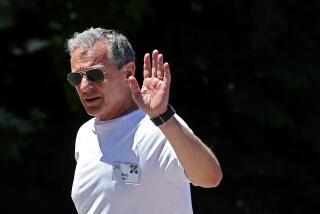Eisner to Assure Board That Disney Is on Track
Walt Disney Co. Chief Executive Michael Eisner has traveled from coast to coast in recent days trying to reassure edgy investors and skeptical analysts that his company is on the mend.
Now Eisner must take that same message to his most important audience: the companyâs board of directors, some of whom have grown increasingly restless over the slide in Disneyâs stock price and its lackluster earnings performance.
On Tuesday, Disneyâs directors will meet at the companyâs Burbank headquarters to consider a number of issues, including the companyâs long-range goals, its governance and responsiveness to shareholder concerns.
At the top of the agenda is how the board should be structured and who should serve. Disneyâs board has been criticized by investors over the years as an undemanding group unwilling to challenge Eisner.
The directors are expected to consider proposals to change the composition of key board committees, redefine what constitutes an âindependentâ board member and shrink the size of the 16-member board, according to sources close to the board. Several long-serving board members may step down as a result of the changes, including Oscar-winning actor Sidney Poitier.
The board also will review a detailed five-year plan for rejuvenating some of Disneyâs struggling businesses, including its ABC television network, the sources said. The plan will outline financial targets the company hopes to achieve at its various divisions.
The meeting comes at a delicate juncture for Eisner, who has led Disney since 1984. Although the 60-year-old executive appears secure in his job, his performance has come under fire in recent months as the companyâs stock has sagged to levels not seen since the mid-1990s. Disneyâs stock rose 43 cents Friday to $15.24 on the New York Stock Exchange.
The stock price has heightened tension between Eisner and key board members Stanley Gold and Roy Disney, one of the companyâs largest individual shareholders. They are pressuring Eisner to move more decisively to turn around key divisions, such as ABC, and to finally clarify his succession plans--a topic that also could surface at Tuesdayâs meeting.
Additional pressure has come from some institutional investors, who have complained openly about Disneyâs performance and its board.
Disney disclosed last month that four of its independent board members had relatives who were employed by Disney or a related company in the last year. The practice might not be allowed under rules proposed by the NYSE. To comply with the new rules, Disney would be required to change the makeup of key committees to ensure that only independent directors serve on a boardâs nominating, compensation and audit committees.
Eisner has taken several steps this year to improve the image of Disneyâs board, including hiring respected corporate-governance expert Ira Millstein and adopting a new policy of barring its auditor from doing consulting work. Last month, Eisner vowed to shrink the size of the board.
Similar reforms are occurring across corporate America as shareholders push for boards to become more accountable after corporate scandals at such companies as Tyco International Ltd., WorldCom Inc. and Enron Corp.
Some institutional shareholders are pressing Disney to do more.
At a meeting last week in New York, Providence Capital, a New York investment banking firm headed by corporate-governance activist Herbert Denton, called on Disneyâs board to detail a succession plan for Eisner, separate the office of chairman and CEO and solicit director nominees from major institutional shareholders, among other proposals.
Itâs unclear, however, how much weight the recommendations carry. Providence Capital is said to own fewer than 2,000 shares of Disney and did not say who attended the meeting or disclose how many shares were represented. Prudential Securities analyst Katherine Styponias, who was at the meeting, said about 60 people attended in person or by phone.
âWe view the recommendations that came out of this meeting as reasonable and could help significantly improve sentiment in the stock,â Styponias wrote in a report.
Disney said it welcomed input from all shareholders and had no comment on the upcoming meeting.
In its cross-country meetings, Disney management has emphasized that the company will rebound when the economy improves and will benefit from its long-term investments in its core businesses, such as the Disney Channel, ESPN and theme parks.
Disney executives have pointed to some encouraging signs of late.
ABCâs fall lineup, for example, got off to a good start last week when two new sitcoms easily won their time slots in overall viewing and among adults ages 18 to 49, the key demographic for advertisers.
The shows, however, were mainly up against reruns on other networks that will debut their schedules this week.
The Disney film studio also had a strong opening for the Mel Gibson movie âSigns,â which has produced more than $214 million at the box office. And the Disney/Pixar Animation Studios film âMonsters, Inc.â set a one-day sales record of 5 million DVDs and videos on its first day of release, the studios reported Wednesday. The one-day figure breaks the previous record of 4.5 million units set by Disneyâs âThe Lion King.â
Still, analysts say any full recovery could take time.
âThey are in a rebuilding mode,â said Tom Wolzien of Sanford C. Bernstein & Co. âThey were dealt a bad hand in terms of the economy....On the other hand, they dealt themselves a difficult hand with ABC.â
Times staff writer Jim Bates contributed to this report.
More to Read
The biggest entertainment stories
Get our big stories about Hollywood, film, television, music, arts, culture and more right in your inbox as soon as they publish.
You may occasionally receive promotional content from the Los Angeles Times.











